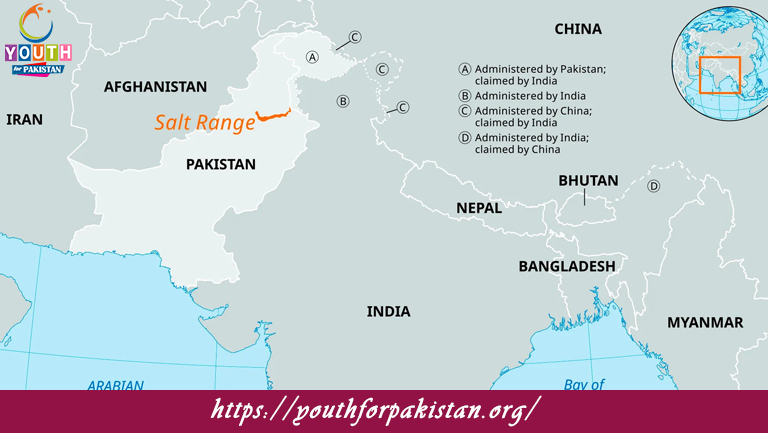Welcome to the Geography of Salt Range MCQs with Answers. In this post, we are sharing Geography of Salt Range Multiple Choice Questions and Answers in Pakistan General Knowledge section for various competitive exams in Pakistan. Find practice Geography of Salt Range practice test with answers here. Each question offers a chance to enhance your knowledge regarding Geography of Salt Range online MCQs Test.
What is the geological classification of the Salt Range?
a) Folded mountains
b) Volcanic mountains
c) Block mountains
d) Residual mountains
Which of the following minerals is abundantly found in the Salt Range?
a) Limestone
b) Quartz
c) Graphite
d) Feldspar
Which river flows near the Salt Range in Pakistan?
a) Indus River
b) Jhelum River
c) Chenab River
d) Ravi River
What is the approximate length of the Salt Range?
a) 100 km
b) 200 km
c) 300 km
d) 400 km
What is the highest peak in the Salt Range?
a) Sakesar
b) Nanga Parbat
c) K2
d) Tirich Mir
Which of the following is a famous pass located in the Salt Range?
a) Khunjerab Pass
b) Khyber Pass
c) Bolan Pass
d) Malakand Pass
What is the main economic activity of the people living near the Salt Range?
a) Agriculture
b) Fishing
c) Mining
d) Tourism
Which of the following historical sites is located in the Salt Range?
a) Rohtas Fort
b) Mohenjo-Daro
c) Taxila
d) Harappa
What is the approximate width of the Salt Range?
a) 10-20 km
b) 20-30 km
c) 30-40 km
d) 40-50 km
Which of the following ranges is situated adjacent to the Salt Range?
a) Karakoram Range
b) Himalayas
c) Sulaiman Mountains
d) Hindu Kush
What is the major natural vegetation found in the Salt Range?
a) Coniferous forests
b) Tropical rainforests
c) Thorny bushes
d) Mangrove forests
Which of the following historical figures is associated with the Salt Range?
a) Alexander the Great
b) Ashoka the Great
c) Mahmud of Ghazni
d) Akbar the Great
Which of the following is a famous tourist attraction located in the Salt Range?
a) Shalimar Gardens
b) Hiran Minar
c) Minar-e-Pakistan
d) Faisal Mosque
What is the average elevation of the Salt Range?
a) 500-1000 meters
b) 1000-1500 meters
c) 1500-2000 meters
d) 2000-2500 meters
Which of the following cities is located near the Salt Range?
a) Lahore
b) Islamabad
c) Peshawar
d) Karachi
What is the historical significance of the Salt Range?
a) Ancient trade route
b) Geological research center
c) Archaeological excavations
d) Center of religious pilgrimage
Which of the following is a famous waterfall located in the Salt Range?
a) Ansoo Lake
b) Shogran Waterfall
c) Neela Wahn Waterfall
d) Saif-ul-Malook Lake
What is the major tourist activity in the Salt Range region?
a) Mountaineering
b) Birdwatching
c) Hiking
d) Rock climbing
Which of the following is a famous historical mosque located in the Salt Range?
a) Badshahi Mosque
b) Wazir Khan Mosque
c) Faisal Mosque
d) Masjid Wazir Khan
What is the major environmental concern in the Salt Range region?
a) Deforestation
b) Soil erosion
c) Desertification
d) Air pollution
Which of the following is a famous hill station located in the Salt Range?
a) Murree
b) Naran
c) Nathia Gali
d) Ayubia
What is the historical significance of the Salt Range during the British colonial period?
a) Salt mining
b) Railway construction
c) Tea cultivation
d) Textile manufacturing
Which of the following minerals is not found in abundance in the Salt Range?
a) Coal
b) Gypsum
c) Dolomite
d) Mica
What is the major landform feature of the Salt Range region?
a) Plateau
b) Valley
c) Delta
d) Peninsula
Which of the following is a famous archaeological site located in the Salt Range?
a) Mohenjo-Daro
b) Harappa
c) Takht-i-Bahi
d) Kot Diji
What is the major source of livelihood for the local communities living in the Salt Range region?
a) Agriculture
b) Tourism
c) Mining
d) Handicrafts
Which of the following rivers originates from the Salt Range?
a) Chenab River
b) Jhelum River
c) Ravi River
d) Sutlej River
What is the major climatic characteristic of the Salt Range region?
a) Mediterranean climate
b) Desert climate
c) Continental climate
d) Tropical climate
Which of the following is a famous historical fort located in the Salt Range?
a) Rohtas Fort
b) Lahore Fort
c) Ranikot Fort
d) Multan Fort
What is the major water body located near the Salt Range?
a) Arabian Sea
b) Bay of Bengal
c) Indian Ocean
d) Caspian Sea
What is the major geological characteristic of the Salt Range?
a) Volcanic eruptions
b) Earthquake-prone zone
c) Mineral deposits
d) Glacial formations
Which of the following is a famous historical temple located in the Salt Range?
a) Katas Raj Temple
b) Golden Temple
c) Vaishno Devi Temple
d) Meenakshi Amman Temple
What is the major animal species found in the Salt Range region?
a) Snow leopard
b) Bengal tiger
c) Asiatic lion
d) Indian rhinoceros
Which of the following is a famous pass located in the Salt Range that connects Punjab and Khyber Pakhtunkhwa?
a) Khunjerab Pass
b) Khyber Pass
c) Bolan Pass
d) Malakand Pass
What is the major transportation route passing through the Salt Range region?
a) National Highway 5
b) Karakoram Highway
c) Grand Trunk Road
d) Indus Highway
Which of the following is a famous historical tomb located in the Salt Range?
a) Shah Jahan’s Tomb
b) Humayun’s Tomb
c) Jahangir’s Tomb
d) Akbar’s Tomb
What is the major plant species found in the Salt Range known for its medicinal properties?
a) Neem
b) Peepal
c) Eucalyptus
d) Aloe vera
Which of the following is a famous pass located in the Salt Range that connects Punjab and Balochistan?
a) Khunjerab Pass
b) Khyber Pass
c) Bolan Pass
d) Malakand Pass
What is the major historical significance of the Salt Range during the ancient Indus Valley Civilization?
a) Maritime trade
b) Agricultural revolution
c) Urban development
d) Metallurgical industry
Which of the following is a famous historical mosque located in the Salt Range that is known for its intricate architectural design?
a) Badshahi Mosque
b) Wazir Khan Mosque
c) Faisal Mosque
d) Masjid Wazir Khan
What is the major environmental challenge faced by the Salt Range region due to extensive mining activities?
a) Water pollution
b) Air pollution
c) Soil degradation
d) Deforestation
Which of the following is a famous Hindu pilgrimage site located in the Salt Range known for its sacred pond?
a) Amarnath Temple
b) Badrinath Temple
c) Katas Raj Temple
d) Kedarnath Temple
What is the major agricultural practice followed in the Salt Range region due to its fertile soil?
a) Horticulture
b) Sericulture
c) Floriculture
d) Viticulture
Which of the following historical personalities is associated with the Salt Range due to his military campaigns and conquests?
a) Alexander the Great
b) Genghis Khan
c) Tamerlane
d) Attila the Hun
What is the major religious significance of the Salt Range for the followers of Sikhism?
a) Birthplace of Guru Nanak Dev Ji
b) Place of meditation for Guru Gobind Singh Ji
c) Final resting place of Guru Arjan Dev Ji
d) Battle site for Guru Gobind Singh Ji
Which of the following is a famous historical fort located in the Salt Range that is known for its strategic location and architectural brilliance?
a) Rohtas Fort
b) Lahore Fort
c) Ranikot Fort
d) Multan Fort
What is the major bird species found in the Salt Range region known for its vibrant plumage and melodious songs?
a) Peacock
b) Parrot
c) Sparrow
d) Bulbul
Which of the following is a famous temple located in the Salt Range that is known for its intricate carvings and ancient sculptures?
a) Amarnath Temple
b) Badrinath Temple
c) Katas Raj Temple
d) Kedarnath Temple
What is the major historical significance of the Salt Range during the medieval period of South Asia?
a) Silk trade route
b) Sufi mysticism center
c) Buddhist pilgrimage site
d) Mughal architectural hub
Which of the following is a famous river originating from the Salt Range that merges into the Indus River?
a) Chenab River
b) Jhelum River
c) Ravi River
d) Sutlej River
The Salt Range is located in which country?
a) Pakistan
b) India
c) Nepal
d) Bangladesh
Which mountain range is adjacent to the Salt Range in Pakistan?
a) Hindu Kush
b) Karakoram Range
c) Himalayas
d) Sulaiman Range
What is the primary geological feature of the Salt Range?
a) Folded mountains
b) Volcanic peaks
c) Plateaus
d) Salt deposits
Which river flows along the eastern boundary of the Salt Range?
a) Jhelum River
b) Indus River
c) Ravi River
d) Sutlej River
The Salt Range is known for its rich reserves of which mineral?
a) Coal
b) Iron ore
c) Gypsum
d) Limestone
Which famous archaeological site is located in the Salt Range and is known for its ancient Buddhist stupas and monasteries?
a) Mohenjo-Daro
b) Taxila
c) Harappa
d) Thatta
The Salt Range is a part of which larger geological structure?
a) Himalayan orogeny
b) Karakoram Range
c) Indo-Gangetic Plain
d) Balochistan Plateau
What is the name of the highest peak in the Salt Range?
a) Mount Everest
b) Mount Nanga Parbat
c) Mount K2
d) Mount Sakasar
The Salt Range is located in which province of Pakistan?
a) Punjab
b) Sindh
c) Khyber Pakhtunkhwa
d) Balochistan
Which famous fort is located in the Salt Range, known for its historical significance and architecture?
a) Rohtas Fort
b) Lahore Fort
c) Attock Fort
d) Derawar Fort
What is the name of the region in the Salt Range known for its salt mines and is one of the largest salt production areas in the world?
a) Salt City
b) Salt Desert
c) Khewra Salt Mines
d) Salt Hills
Which wildlife sanctuary is located in the Salt Range, known for its conservation efforts and protection of wildlife species?
a) Khunjerab Wildlife Sanctuary
b) Churna Island Wildlife Sanctuary
c) Kirthar Wildlife Sanctuary
d) Soan Wildlife Sanctuary
Which famous archaeological site in the Salt Range is recognized as a UNESCO World Heritage Site for its historical importance?
a) Harappa
b) Mohenjo-Daro
c) Taxila
d) Thatta
What is the name of the traditional craft practiced by the inhabitants of the Salt Range, known for its intricate pottery and ceramics?
a) Pottery
b) Rug weaving
c) Wood carving
d) Embroidery
The Salt Range is rich in which geological formation that is a significant source of raw material for the cement industry?
a) Marble
b) Limestone
c) Granite
d) Shale
What is the name of the famous waterfall in the Salt Range, which is a popular tourist attraction and is often called the “Queen of Waterfalls”?
a) Neela Wahn Waterfall
b) Shingrai Waterfall
c) Sajikot Waterfall
d) Pir Ghaib Waterfall
The Salt Range is home to diverse flora and fauna, including species like the Markhor and Urial. Which wildlife sanctuary in the region contributes to their conservation?
a) Khunjerab Wildlife Sanctuary
b) Churna Island Wildlife Sanctuary
c) Kirthar Wildlife Sanctuary
d) Togwotee Pass Wildlife Sanctuary
Which river flows along the western boundary of the Salt Range, providing water for irrigation and agricultural activities?
a) Indus River
b) Jhelum River
c) Chenab River
d) Ravi River
What is the name of the traditional headgear worn by the inhabitants of the Salt Range, often made of cotton and designed to provide protection from the sun?
a) Turban
b) Paghdi
c) Pakol
d) Fez
Which historical figure is associated with the spread of Buddhism in the region encompassing the Salt Range?
a) Ashoka the Great
b) Chandragupta Maurya
c) Kanishka the Great
d) Harsha Vardhana
What is the name of the traditional craft practiced by the inhabitants of the Salt Range, involving the intricate weaving of woolen carpets and rugs using traditional techniques?
a) Pottery
b) Embroidery
c) Rug weaving
d) Wood carving
What is the name of the famous ancient fort located in the Salt Range, known for its historical significance and architectural design?
a) Rawat Fort
b) Rohtas Fort
c) Red Fort
d) Ranikot Fort
Which river flows along the western boundary of the Salt Range, providing water for irrigation and agricultural activities?
a) Indus River
b) Jhelum River
c) Chenab River
d) Ravi River
What is the name of the famous festival celebrated by the inhabitants of the Salt Range, marking the arrival of spring and the harvest season?
a) Baisakhi Festival
b) Basant Festival
c) Jashn-e-Baharan
d) Lohri Festival
Which historical figure is associated with the establishment of the ancient city of Taxila in the Salt Range?
a) Alexander the Great
b) Chandragupta Maurya
c) Kanishka the Great
d) Ashoka the Great
The Salt Range is known for its unique rock formations and landscapes, which attract geologists and researchers from around the world. What is the name of the unique rock formation that resembles a human hand?
a) Hand of Fatima
b) Hand of God
c) Hand of Buddha
d) Hand of Hazrat Ali
Which of the following is a traditional dance form that is often performed during cultural events and festivals in the Salt Range?
a) Bhangra
b) Kathak
c) Attan
d) Garba
The Salt Range is known for its traditional handicrafts, including the intricate art of mirror work and embroidery. What is the name of the traditional craft associated with this region?
a) Phulkari
b) Chikankari
c) Kantha
d) Zardozi
The Salt Range is home to diverse wildlife, including various bird species that inhabit the region’s forests and wetlands. What is the name of the bird sanctuary located in the Salt Range, known for its conservation efforts and protection of avian species?
a) Churna Island Bird Sanctuary
b) Manchar Lake Bird Sanctuary
c) Kirthar National Park Bird Sanctuary
d) Uchhali Lake Bird Sanctuary
What is the name of the famous waterfall in the Salt Range that is known for its scenic beauty and picturesque surroundings, attracting tourists and nature enthusiasts?
a) Shingrai Waterfall
b) Pir Ghaib Waterfall
c) Sajikot Waterfall
d) Neela Wahn Waterfall










